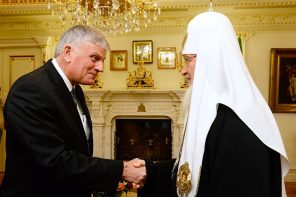Like many across the world, I watched and waited for news of the 33 miners in Chile that began their perilous ascent from the mine that was their home for 69 days late Tuesday night. As one by one they emerged into the media spectacle that will be their lives for the next few weeks, I was struck by the stories that accompanied them. In the past few weeks we learned of several mistresses and one newborn; the personal lives of these men exposed for the world’s scrutiny. Through the scandals, the drilling, and the anticipation, we heard repeatedly about faith—the faith that accompanied these men for over two months.
Mario Sepulveda claims that he witnessed the fight between good and evil in the shadowy darkness 2,300 feet below the earth’s surface, and in the end God won. It was his faith in God that assured him of his rescue. Nineteen-year-old miner Jimmy Sanchez wrote in a letter sent up prior to his rescue, “There are actually 34 of us, because God has never left us down there.” Miner Ricardo Villaroel describes the incident as a moment of faith renewal, “I never use to pray, here I learned to pray. I got closer to God.”
Many of the miners thanked God upon ascending from the shadows, others spoke of the faith that kept all of their hope alive. The sacred physically accompanied them as well: Bibles, crucifixes, statues of Mary and the saints were all sent down to the mine where a makeshift shrine was reportedly built. Above-ground, shrines and altars are said to dot “Camp Hope,” where families waited and prayed for the arrival of their loved ones.
Faith is also a major them of the national rhetoric. At the beginning of the rescue Chilean President Sebastian Pinera stated, “When the first miner emerges safe and sound, I hope all the bells of all the churches of Chile ring out forcefully, with joy and hope. Faith has moved mountains.” Many are describing the rescue of the 33 as a modern-day miracle, including those who worked on the operation itself. “It was 75 percent engineering and 25 percent a miracle,” topographer Macarena Valdes said in an interview with the Wall Street Journal.
The incident has also taught us something about Chile’s Christian landscape as a whole, which is overwhelmingly, though not entirely, Roman Catholic. Jose Henriquez, known as the spiritual leader of the group, is characterized by the media as an evangelical. Above ground, stories of different denominations vying to console nervous families over the past two months have dotted the internet. In the end, the competition over authentic Christianity that characterizes Latin America as a whole continued in the midst of tragedy.
Yet at least today, having felt like I did witness a modern-day miracle as I watched man after man emerge from the darkness, I do not want to turn this story into an academic exercise. Today, when we have a story that so easily could have ended in tragedy but instead ended in joy, I do not want to discuss statistics or dissect this incident. I want to let the miners rejoice in their faith, I want Chile to celebrate their miracle, I want to recognize the 34th miner they felt among them.




